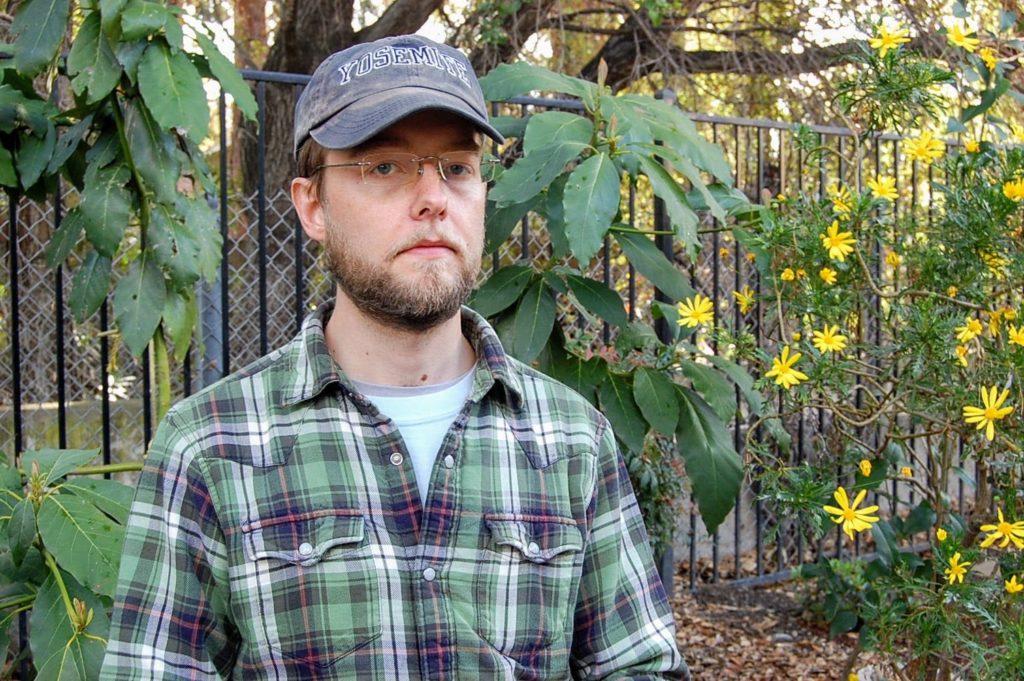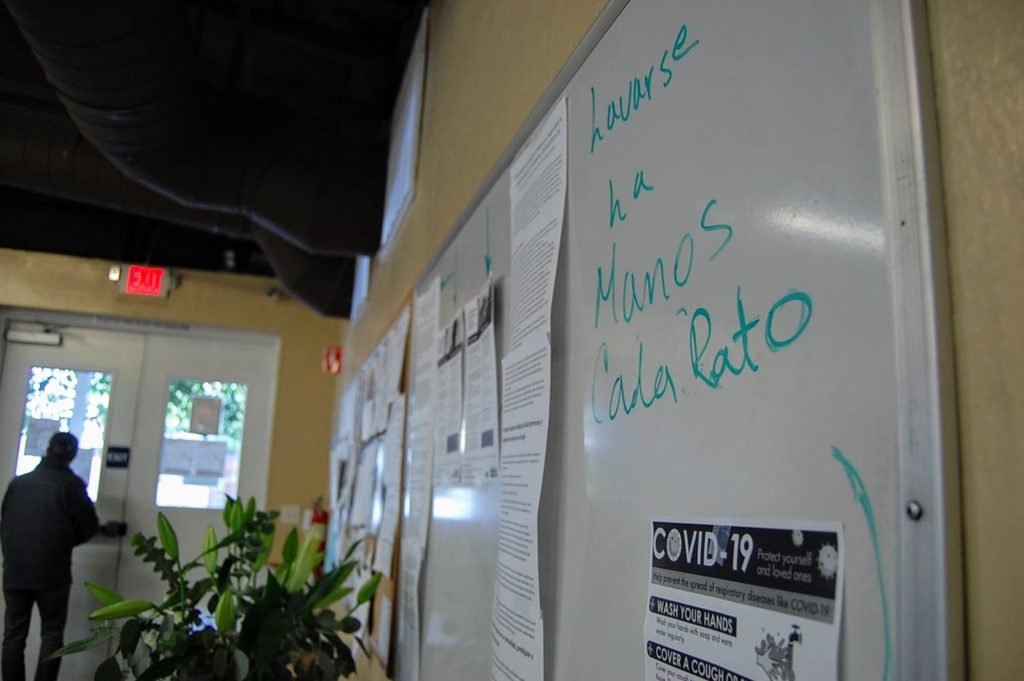Next to a sketch of a waterfall on a whiteboard at the Day Worker Center of Mountain View, Harlan Iverson, a former Silicon Valley software engineer, wrote an equation and graph showing exponential growth of COVID-19, the disease caused by the coronavirus.
Iverson, 35, has been next in line for the center’s laborer list, waiting for a job since March 14 — nearing a week from Thursday. The average wait time for odd jobs, before the infectious virus tore through Silicon Valley, was a day or two.
Instead of going to work that morning, Iverson stood outside the center, near the avocado trees, fruits and vegetables planted by the workers.
“You can feel the tension,” said Iverson. “I know cabin fever well, and this is definitely cabin fever happening.”
Because of the coronavirus pandemic, work has been scant for day laborers and those who can’t work from home. Only four people at the center had been sent out for the week as of Thursday, according to the center, on jobs that included gardening. All landed the gigs because of previous relationships with employers.
Normally, as spring blossoms, work picks up in gardening, moving, cleaning and construction — jobs the Day Worker Center normally contracts, serving an informal Bay Area economy largely through low-wage, immigrant and often undocumented labor. Now these workers are among the most vulnerable during the pandemic.

Iverson lives in his car. He uses gardening work to save for a hotel room that can give him more stability. A vegan who already practices fasting, he said he’s been able to get by budgeting, but closures of gyms, where he gets showers, have made it difficult to even look presentable for jobs.
“The pandemic is exaggerating the economics and making the divide even stronger,” he said.
For day workers like Iverson, the compounded effects of immigration status, homelessness and unstable work precluding them from unemployment benefits may worsen already dire circumstances.
“We don’t have work, we don’t have family, we don’t have a place to stay, and we don’t have each other,” said Maria Marroquín, the center’s executive director who has been trying to meet the needs of clients while balancing budget and public health constraints. “It’s the perfect storm.”
Many of these jobs fall under “nonessential” work deemed by Santa Clara County health officials and Gov. Gavin Newsom who issued strict stay-at-home orders to stop the virus’ rapid spread.
Most day laborer centers have also closed throughout the country, CALmatters reported, but the Mountain View center has stayed open, despite significant losses to work from local property owners, businesses and contractors who solicit work.
Precautions for social distancing, too, have limited the number of people awaiting work at the center. On Thursday, just 20 people were in the office, including four staff members. Typically, 50 people visit the center on weekdays for work

Much of the center’s other resources, like English classes and vocational training, have been canceled to reduce the risk of the virus spreading. The center is providing free lunches to out-of-work laborers, officials said.
Greater worker protections
The National Day Laborer Organizing Network, which supports workers and centers, has started an immigrant worker safety net fund to donate resources for laborers who lack job security, paid sick time, health care or access to other services.
The network has already called on local and national officials for a moratorium on immigration enforcement, which affects day laborers who often lack legal status in the country, as well as greater worker protections through paid sick leave and unemployment insurance for low-wage earners.
“COVID doesn’t care about what country you were born in, or how much you earn in a year,” said Nadia Marin-Molina, the network’s co-director, in a March 11 statement. “But it does make more clear the urgency of our demands for worker and migrant justice – ignoring them now is pure folly.”
Mountain View center day laborer José Villegas Fuentes is struggling to make the $2,030 rent for his family’s apartment. He understands measures taken to reduce the spread of the virus, but he hasn’t worked in two weeks. His wife, at home with their two kids after classes were canceled, can’t return to her house cleaning job until April.
“No, es dificil,” said Villegas Fuentes, who is originally from Guerrero, Mexico. “For me, that’s the impact, because I don’t have money to say, ‘I don’t have to work today, but I can go get what I have saved.’”
Higher risk for laborers
At 63, Villegas Fuentes is also at higher risk of falling seriously ill to the coronavirus, according to the Centers for Disease Control and Prevention. His children tell him not to leave the house, he said.
“They tell me ‘no, it’s important that we stay here.’ But what are we going to do if we have no money?’” he said.

In the South Bay, Marroquín said it’s hard for day workers to secure basic necessities, such as food or showers amid the pandemic. The center, for example, has restrooms and a commercial kitchen, which can help vulnerable populations, but the organization needs help with utilities to keep the lights on, she said.
During his family’s last visit to the grocery store, Villegas Fuentes got them milk, canned food and bread.
Marroquin hopes the center — and its workers — come out stronger from the widespread coronavirus pandemic.
“My hope is that after this crisis, our values will change — our way of living will change,” she said. “We will be more appreciative for the possibility of having food, of having space, of having a place to sleep. And we will come out stronger in all aspects.”
How to help
- Make a donation to the Day Worker Center of Mountain View here.
- To donate to the National Day Labor Organizing Network Fund, click on this link.
- Silicon Valley Strong, which provides information and donations to people and businesses in need across Santa Clara County. Click here to learn more.
Contact Eduardo Cuevas at [email protected] or follow @eduardomcuevas on Twitter.



Leave a Reply
You must be logged in to post a comment.